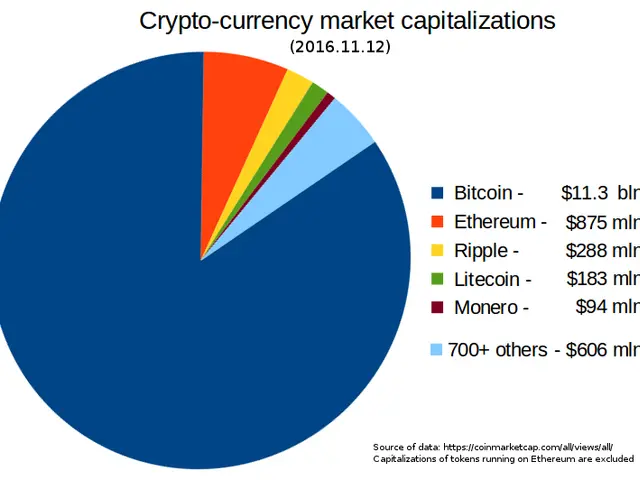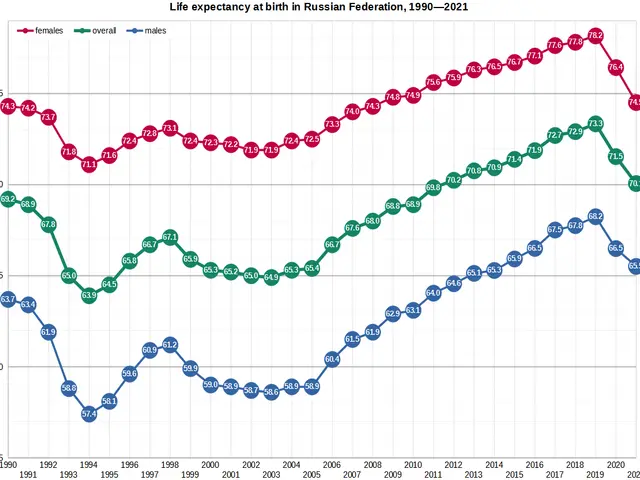Plummeting Russian oil prices reach two-year nadir, Kremlin grapples with agonizing decisions - Reuters (paraphrased)
Russia's Oil Woes: A Budget Nightmare
The price of Russian oil has plummeted, knocking it below $49 per barrel - an almost two-year low and 40% below the state budget estimates. This dismal figure was revealed by Reuters, who also stated that this dip is the bottom-most since May 2023.
On average, Russia's Urals and ESPO blends currently cost $48.92 per barrel, significantly less than the budget price point set at RUB 6,700 (around $83). The latest drop is attributed to global oil production outpacing consumption and fears of a global economic slowdown caused by trade tariffs as mentioned by US President Donald Trump.
Moreover, the Organization of the Petroleum Exporting Countries' (OPEC) decision to pick up the pace on output growth has further exacerbated the issue.
Oil is a substantial source of revenue for Russia, making up around one-third of the country's budget revenues. Recently, the government increased its 2025 military spending by 25% - to 6.3% of GDP - the highest since the Cold War. Despite the troubling financial situation, Russia is currently embroiled in its fourth year of war against Ukraine, leading many analysts to speculate that the Kremlin will be compelled to either hike taxes, slash social spending or increase borrowing in order to balance the budget without compromising defense expenditure.
The turn of events is causing some optimism, however. US President Trump asserted that both Moscow and Kyiv are eager to reach an accord to end the ongoing conflict, and that recent price drops have seemingly softened Russian leader Vladimir Putin's stance towards peace.
The precipitous fall in oil prices has resulted in a substantial budget deficit for Russia. As a remedy, the government has revised its 2025 budget deficit forecast from 0.5% to 1.7% of the GDP. This hike comes after they lowered their energy revenue forecast by 24% due to predictions of a prolonged period of low oil prices.
Given these dire circumstances, experts warn that Russia will likely struggle to maintain fiscal stability in the near future, raising important questions about the country's long-term economic prospects.
Factors Affecting Russia's Oil Prices
- Global oil production surpassing consumption: The escalating production and stagnant consumption levels globally have contributed to the oil price drop.
- Statements from US President Donald Trump regarding trade tariffs: US President Trump's remarks about trade tariffs increased worries about a potential global economic downturn, affecting oil prices negatively.
- OPEC's decision to accelerate the pace of output growth: OPEC, including Russia, upping production has further impacted the oil market and resulted in reduced prices.
Background
- Russia is currently facing a significant budget shortfall due to the decline in oil prices.
- US President Donald Trump has claimed that the fall in oil prices puts pressure on Russia and increases the likelihood of a peace agreement to end the war in Ukraine.
- The escalating global oil production surpassing consumption levels has significantly contributed to the drop in Russia's oil prices, leading to a substantial budget shortfall.
- US President Donald Trump's statements regarding trade tariffs have increased worries about a potential global economic slowdown, further negatively impacting oil prices.
- OPEC's decision to accelerate the pace of output growth, including Russia, has exacerbated the oil market situation, resulting in reduced prices. This decision, in turn, raises important questions about Russia's long-term economic prospects given the crucial role oil plays in the country's budget revenue.






